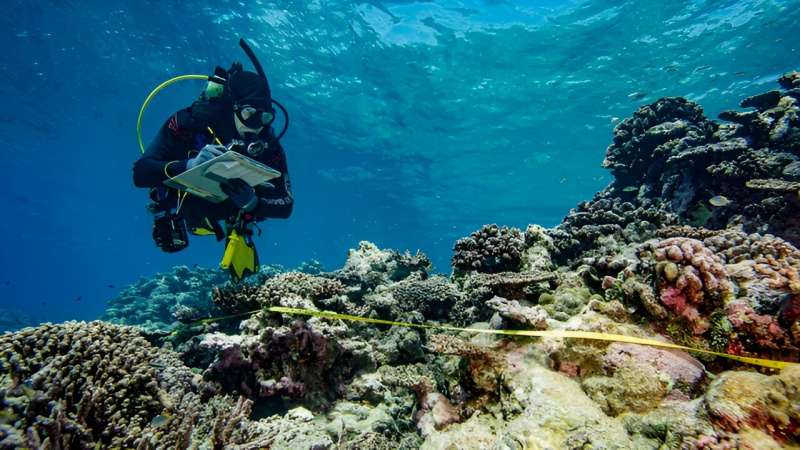This article has been reviewed according to Science X's editorial process and policies. Editors have highlighted the following attributes while ensuring the content's credibility:
fact-checked
peer-reviewed publication
trusted source
proofread
Corals can bounce back after heat waves, but only if there's enough time between them

With marine heat waves of varying severity identified in Australian waters over the summer, a new study of a remote coral reef in the north-west has found that they can recover from bleaching events caused by heat waves, and other disturbances, as long as there is enough time.
The Australian Institute of Marine Science (AIMS)-led research was based on data gathered over the course of 30 years at the remote Scott Reefs, located between north-west WA and Indonesia.
It covered periods of disturbances including intense cyclones and mass bleaching in 2016 and 2017 caused by warm ocean temperatures.
The study found cycles of collapse and recovery, during which coral numbers crashed and then slowly regenerated.
AIMS coral scientist Dr. Luke Thomas said the finding offers a glimmer of hope for reefs.
"It speaks to the resilience of these ecosystems that there's this inherent ability to recover from disturbances," he said.
"The catch is that enough time needs to pass for them to recover.
"When bleaching events happen every year, as is forecast for the future, that's another story.
"If there are recurrent disturbances and the corals can't recover—these ecosystems will collapse."
The research focused on reef-building Acropora corals, and included genetic studies that showed coral diversity was maintained over time, a key component of their resilience to climate change.
Dr. Thomas said the research is one of the most detailed coral monitoring studies in the world.
"It's one of the few datasets where we're not just looking at a single snapshot but at how disturbances impact coral populations over time," he said.
"Genetic diversity is the fuel for adaptation and of extreme importance to coral reefs, especially on remote systems like the Scott Reefs where populations are isolated from neighboring reefs and reliant on local larval sources to maintain healthy populations.
"The Scott Reefs allow us to understand fundamental processes in ecology and evolution in isolation. These lessons can then to applied to larger systems like the Great Barrier Reef."
Marine scientists have been preparing for a hot summer, with some ocean heat waves detected in northern Australian waters, driven by El Niño conditions, a positive Indian Ocean Dipole and climate change.
Dr. Thomas said Western Australia is home to some of the healthiest coral reefs in the world.
The health of places like the Scott Reefs are assisted by their isolation, benefiting from good water quality and relatively low levels of fishing, he explained.
But Dr. Thomas said the long-term prognosis for coral reefs is difficult with climate change-related disturbances predicted to increase.
"Our research speaks to the current resilience of these reef systems," he said.
"They're remarkable—they can handle a lot of pressure and a lot of disturbance. But climate change is approaching those tipping points where the corals won't be able to recover."
The paper is released as aerial surveys undertaken by AIMS and the Great Barrier Reef Marine Park Authority have confirmed a fifth mass bleaching event since 2016 unfolding across the Great Barrier Reef Marine Park.
The study was published in the journal Communications Biology.
More information: L. Thomas et al, Resilience to periodic disturbances and the long-term genetic stability in Acropora coral, Communications Biology (2024). DOI: 10.1038/s42003-024-06100-0
Journal information: Communications Biology
Provided by Australian Institute of Marine Science


















